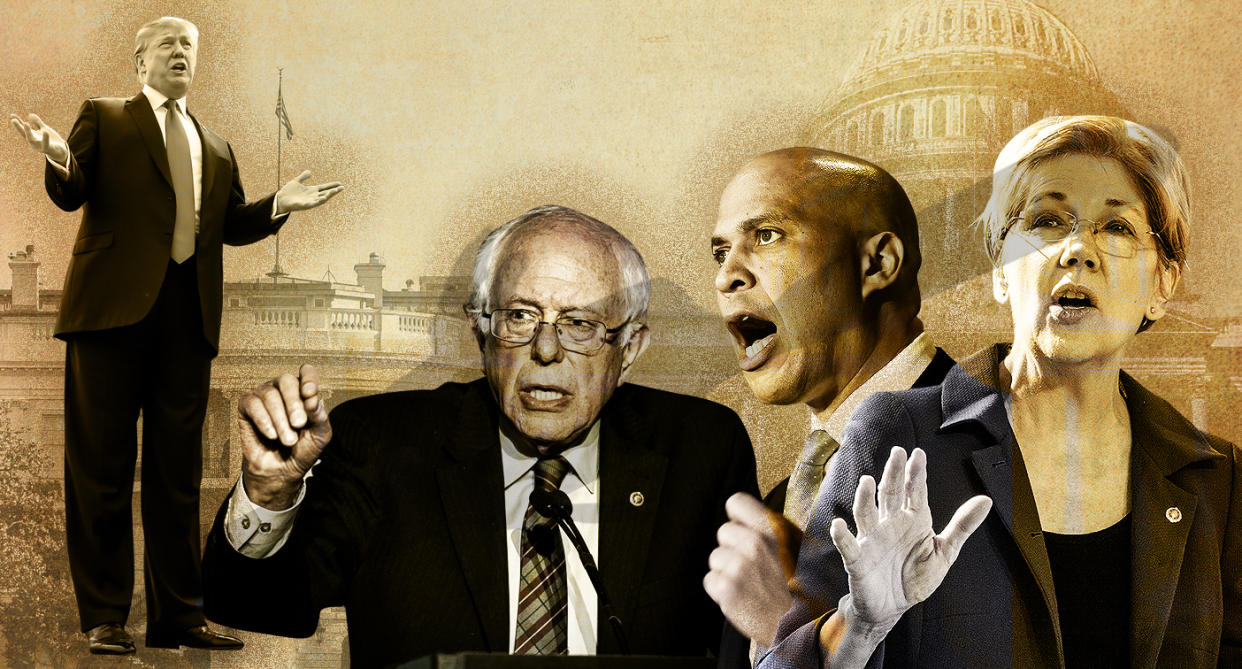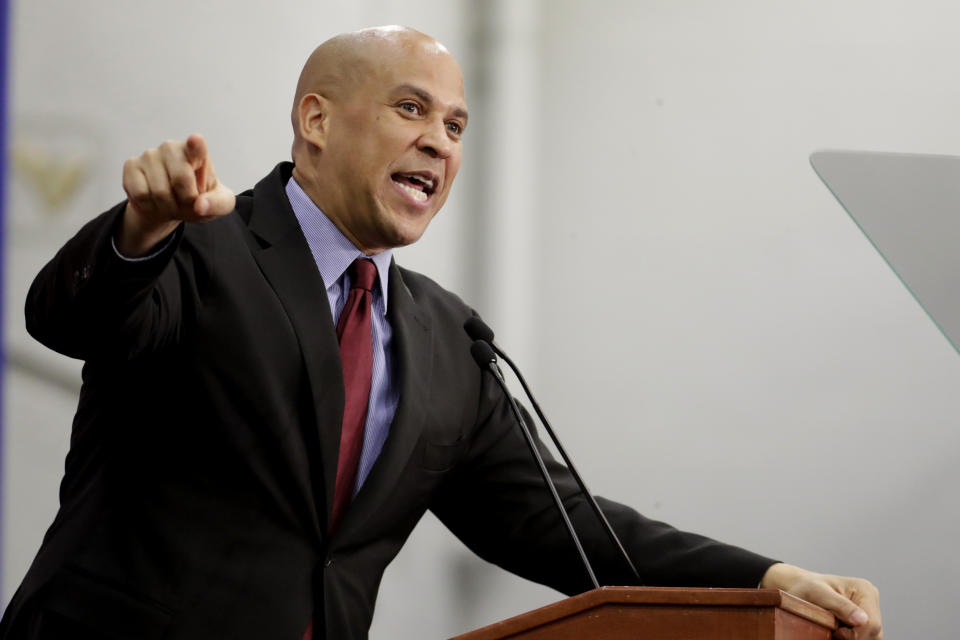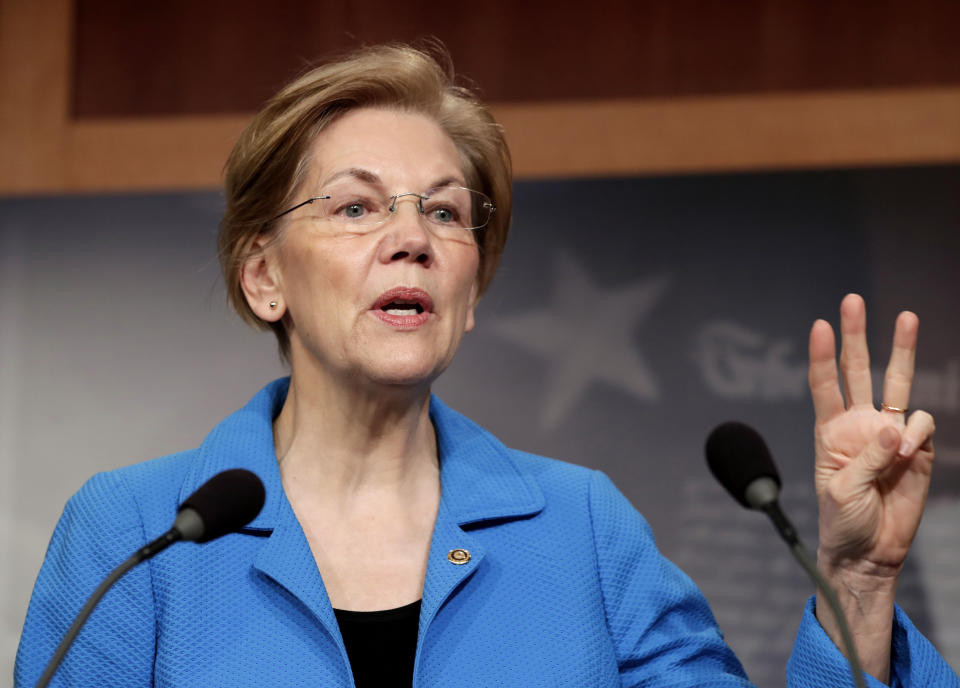To thwart Trump, progressives and mainstream Democrats show willingness to bury the hatchet

WASHINGTON — “We are living in a time of miracles,” New York City Mayor Bill de Blasio said Tuesday, about halfway through the 2018 Ideas Conference, an annual gathering of Democrats hosted by the Center for American Progress, the influential liberal think tank.
One small miracle in evidence on Tuesday afternoon was a show of comity between the progressive and establishment factions of the Democratic Party, which have been feuding since the divisive 2016 presidential primary, in which Sen. Bernie Sanders, independent of Vermont, made former Secretary of State Hillary Clinton seem like a creature of Wall Street with few ideas for the 21st century. Clinton supporters, by contrast, painted Sanders as a firebrand lacking achievements and substance.
Until this week’s conclave, there has been little evidence that these divisions might be resolved ahead of the 2018 midterms. But at Wednesday’s event, Democrats showed a determination to make the marriage between moderates and progressives work, in large part in order to defeat Republicans in the looming congressional elections and, even more important, reclaim the White House two years later.
As the conference was about to begin, Fleetwood Mac’s “Go Your Own Way” played on the stereo system. It is a song of defiance (“Loving you / Isn’t the right thing to do”), by a band that played at Bill Clinton’s 1993 inauguration ball. But the message wasn’t intended for grassroots activists who’ve come to believe that Clinton’s liberal presidency was anything but. That much was made clear by Center for American Progress Vice President Winnie Stachelberg, who opened the event with a reminder of who wakes up at 1600 Pennsylvania Ave. each morning.
“It’s clear that the moment for decisive action is now,” Stachelberg said.

That action, according to the more than dozen Democratic luminaries that followed, would consist of a progressive agenda, one that would offer a stark counterargument to the corporation-friendly, regulation-averse approach of the Donald Trump administration. At the same time, it increasingly appears that Democrats are willing put aside their differences on divisive issues like reproductive rights and racial disparity in order to focus on an ambitious economic agenda that will include universal health care, tuition-free public college, a federal jobs guarantee and a $15-per-hour minimum wage. Sen. Sherrod Brown, D-Ohio, cast the issue in Manichaean terms: “Are you on the side of Wall Street or are you fighting for the little guy?”
Others sought to reframe convictions in economic terms, in an apparent recognition of how central that issue is becoming to Democratic prospects. “Women in positions of power changes everything,” said Sen. Kirsten Gillibrand, D-N.Y., a leader in the #MeToo movement. She argued that if women were represented in Congress relative to their share of the general population (that is, at 51 percent), policy proposals like paid family leave would no longer be the stuff of liberal fantasy.
Washington Gov. Jay Inslee took an identical approach with his own signature issue: global warming. “There is no better jobs message in America than green energy today,” he said. The tension was best delineated by Sen. Christopher S. Murphy, D-Conn., who has become one of the most vociferous advocates in Congress for gun control: “Social progress cannot be achieved without economic progress.” The reverse, he said, was also true.
As the cliché du jour dictates, one must walk and chew gum at the same time. Sen. Amy Klobuchar, D-Minn., assured that her party could do just that. “Progressives can do two things at once. We can, one, focus on the optimistic economic agenda and what needs to be done there and, secondly, protect our democracy.”
Hillary Clinton, who once famously described herself as a “progressive who likes to get things done,” went largely unmentioned, in an apparent sign of how little enthusiasm Democrats have for summoning the aggrieved spirits of 2016. But those spirits lingered, nevertheless. The Center for American Progress was founded by John D. Podesta, who chaired her presidential campaign, and is headed by Neera Tanden, a close Clinton ally. The think tank’s vice president is Jennifer M. Palmieri, who served as Clinton’s communications director. In an aside during a conversation about women in politics, Palmieri acknowledged that a “big hurdle” during the campaign was dispelling an intense dislike for Clinton that was not tethered to any particular policy position.
Another notable absence was former Vice President Joseph R. Biden Jr., who would arguably become the Democratic frontrunner the moment he announced for the presidency (he has not made clear whether he will do so). Biden went unmentioned despite the inarguable fact that his entrance into a Democratic primary would radically reconfigure the race.

That may be because the day was, in large part, an overture to progressives and their ideas. It also served as a kind of audition for 2020 candidates. Among these was Julián Castro, who served as President Obama’s secretary of Housing and Urban Development. In a deft and uplifting speech, Castro contrasted the happy news that Michael Brown, an African-American teen from Houston, had recently been accepted to 20 prestigious colleges, with the tragic plight of Michael Brown, the Ferguson, Mo., high school graduate killed by a police officer in 2015.
“If we want more success stories like Michael Brown of Houston, then we can’t forget about Michael Brown of Ferguson,” said Castro, who could declare for the presidency soon.
Another likely presidential candidate is Cory A. Booker, D-N.J., who delivered the lunchtime keynote address as the Ideas Conference. Indulging in his tendency toward orotund rhetoric, Booker delivered an impassioned speech about racial and economic uplift. “A lot of this is common sense,” Booker said of proposals like raising the minimum wage and offering universal early education, even if these would have been deemed too radical for the American populace a decade ago. “That’s the best use of taxpayer dollars, because it grows the whole.”
Booker said he had recently read J.D. Vance’s Hillbilly Elegy, a lament for working-class America that had been embraced by many on the right and some on the left. “We in this country have a common pain, but we are lacking a sense of common purpose,” he said.
Democrats plainly intend to argue that, despite endless tweets from Trump about the nation’s robust economic health, working-class and poor Americans are ailing. It is a reverse of the strategy Republicans used when Obama was president, contending that the recovery from the housing and financial crisis of 2008 inordinately benefited Americans living in wealthier coastal redoubts like New York and California. At the same time, Democrats evidently plan to portray Trump as a singularly divisive figure incapable of healing economic or any other wounds. “The zero-sum society may be his, but it is not ours — or America’s,” said Connecticut’s Murphy, another potential 2020 contender.
Another young Democrat whose prospects have been rising is Rep. Joseph P. Kennedy III, D-Mass., a grandson of Robert F. Kennedy. Earlier this year, Kennedy capably delivered a response to Trump’s first State of the Union address. On Wednesday, he spoke with visible emotion about his constituents’ struggle to find health care they could afford.
“We have to ensure that every single American can find access to a doctor’s door when they need it,” Kennedy said. “Period.”
He was followed by a fellow legislator from the Bay State, Sen. Elizabeth Warren. Much as she did during the 2016 presidential campaign, when she proved a surprisingly eager surrogate for Clinton, Warren tore with relish into Trump, who she said was treating government as “just another rich man’s toy.” She contrasted his version of public service with her own, describing how she had been born in Oklahoma, on “the ragged edge of the middle class,” married at 19 and seemingly without prospects.
“I made it in this country because America gave me a chance,” Warren said, sounding very much like a presidential candidate (she has denied that she plans to run). She also urged the audience “throw a punch once in a while” in defense of American democracy.
“A verbal punch,” she quickly added.
Read more from Yahoo News:

